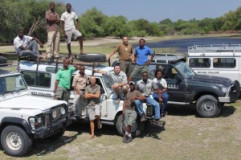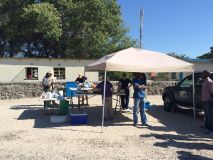Principal Investigator

Alice J. Hovorka, Professor and Dean of the Faculty of Environmental & Urban Change, York University
I obtained my Bachelor of Arts (Honours) in Geography from Queen’s University in 1994 and my Master of Arts in Geography from Carleton University in 1997. Following graduation I consulted on urban issues for CIDA (Canadian International Development Agency) and worked as an IDRC (International Development Research Centre) intern mainstreaming gender within urban agriculture projects. I received my PhD in Geography from Clark University in 2003, focusing on gender and urban agriculture in Botswana. I joined the University of Guelph Department of Geography in 2003 as Assistant Professor, became a Humboldt Fellow in 2009, and was promoted to Full Professor in 2014. In January 2015 I joined the Department of Geography and Planning and served as the Director of the School of Environmental Studies at Queen's University (2015-18). I am now in my second term as Dean of the Faculty of Environmental & Urban Change at York University (2018-2028).
My research program broadly explores human-environment relationships and is theoretically informed by feminist, poststructuralist and posthumanist philosophical perspectives. My main specializations include animal geographies, gender and environment, and urban geography.
I currently explore how animals shape human society. We cannot understand human affairs and relations without recognizing the ways in which animals are wrapped up with social constructions, organizations and dynamics. How do we think about animals? Where do we put them and where do they belong? How do we interact with them? Are these human-animal relations good, bad, otherwise? What circumstances and experiences shape the lives of animals? Chickens, donkeys, cattle, wild dogs, elephants, and domestic dogs in Botswana serve as case studies exploring the positionality of animals as influential actors (funded by a SSHRC Insight Grant 2012-2016). More recently, case studies focused on lions, coyotes, monkeys, and cows highlight the networks of actors, knowledges, structures, practices, and outcomes that shape human interactions of animals in Botswana, Canada and Costa Rica (funded by a SSHRC Insight Grant 2016-2023).
Students
| Animashaun, Oluwatosin | Masters in Environmental Studies, Queen's University completed 2019 (community-based conservation) |
| Bolla, Andrea | Masters in Geography, University of Guelph completed 2009 (human-wild animal relations) |
| D'Souza, Renée | Masters in Environmental Studies, Queen's University completed 2018 (conservation canines) |
| Edmunds, Natasha | BA in Environmental Governance, University of Guelph completed 2015. Undergraduate Research Assistant 2014/15 for Guelph Cat Population Task Force (feral cats) |
| Fraser-Celin, Valli | PhD in Geography, University of Guelph completed 2018 (wild dogs). Funded by Vanier Scholarship 2015-18, Fonds de Recherche Société et Culture Quebec 2014-15, Ontario Graduate Scholarships 2013 & 2014, Summerlee Scholarship 2015. |
| Geiger, Martha | Masters in Geography/International Development Studies, University of Guelph completed 2013 (donkeys). Winner of the OP Dwivedi Award for Best International Development Thesis, University of Guelph 2013. |
| Jamieson-Hanes, Jean | Masters in Environmental Studies, Queen's University completed 2020 (road-killed animals) |
| Legault, Danielle
MacKay, Carley Marchese, Alyssa |
Masters in Geography, York University completed 2023 (development)
PhD in Geography, York University completed 2021 (cows) Masters in Environmental Studies/JD, York University in progress (law) |
| Mayberry, Allison | Masters in Geography, University of Guelph completed 2016 (elephants). Funded by Ontario Graduate Scholarship 2014 and Care-A-Thon Animal Welfare Scholarship 2014, Ontario Veterinary College University of Guelph. |
| McCubbin, Sandra | PhD in Geography, Queen's University completed 2019 (lions). Funded by Vanier Scholarship 2016-19. |
| Must, Erin | PhD in Geography/International Development Studies, University of Guelph completed 2019 (cattle). Funded by Vanier Scholarship 2014-17, IDRC Doctoral Award 2014, Summerlee Scholarship 2015. Winner of the OP Dwivedi Award for Best International Development Thesis, University of Guelph 2019. |
| Speiran, Siobhan | PhD in Environmental Studies, Queen's University completed 2023 (monkeys). Funded by SSHRC CGS Doctoral 2019-22. |
| Van Patter, Lauren | PhD in Geography, Queen's University in progress (urban coyotes). Funded by SSHRC CGS Doctoral 2017-20. Masters in Geography, University of Guelph completed 2015 (feral cats, domestic dogs). Winner of the AAG Animal Geography Specialty Group Graduate Paper Competition 2015. Funded by SSHRC Masters Award 2013 and Ontario Graduate Scholarship 2014. |
Collaborators
- Animals in Philosophy, Politics, Law and Ethics (APPLE) Research Group at Queen's University via Will Kymlicka and Sue Donaldson
- Bing, Mark (DVM), Vetswana, Botswana.
- Campbell Centre for the Study of Animal Welfare. University of Guelph, Guelph Canada.
- Department of Environmental Science at University of Botswana, Gaborone Botswana
- Evans, Kate (PhD), Elephants for Africa, Botswana and Mammal Research Unit at University of Bristol, United Kingdom.
- Government of Botswana (including Ministry of Agriculture; Ministry of Environment, Wildlife & Tourism, Department of Wildlife & National Parks; Ministry of Labour & Home Affairs, Gender Affairs Department).
- Guelph Cat Population Task Force, Guelph Canada.
- Hovorka, Mark (MSc), Independent Scholar (Biology, Environmental Policy).
- Maude, Glyn (PhD), Kalahari Research and Conservation Group, Botswana and Mammal Research Unit at University of Bristol, United Kingdom.
- Maun Animal Welfare Society, Maun Botswana.
- Petitt, Andrea (PhD), Centre for Gender Research, Uppsala University, Sweden.
- Niel, Lee, (PhD) Population Medicine, OVC, University of Guelph.



